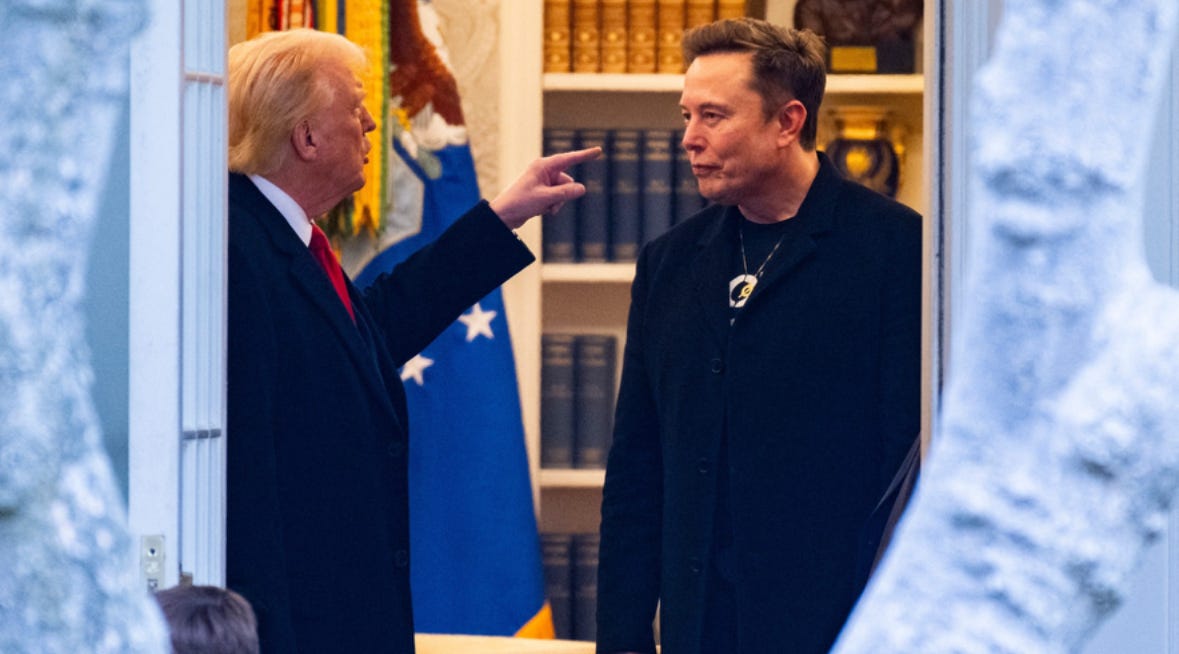The Breakup
At some point, every marriage of convenience turns inconvenient.
Elon Musk’s call to impeach Donald Trump wasn’t just a personal betrayal. It was a moment of ideological rupture—a loud, messy, almost cinematic falling out between two men who had once found common cause in their disdain for government, reverence for power, and love of the spectacle.
Now the spectacle is eating itself.
Just months ago, Musk was the crown prince of the Department of Government Efficiency, gleefully waving a chainsaw and posing in the Oval Office with his son like it was Comic-Con for billionaires. Trump needed a foil for the bureaucrats. Musk needed a stage. And for a while, it worked.
But populism is a jealous ideology. It doesn’t share well.
Trump’s base never fully warmed to Musk. Too weird. Too global. Too rich in the wrong way. And Musk’s fanboys—many of whom flirt with libertarianism and loathe state control—saw Trump’s “One Big Beautiful Bill” for what it was: central planning wrapped in patriotic drag. A $1.6 trillion fever dream that guts civil services while pretending to restore order.
Then came the Epstein bomb.
Whether true or not (and we should say: no evidence has emerged to verify Musk’s claim), it was a clear escalation. Not a policy critique. Not a disagreement on tariffs or debt ceilings. But a nuclear-level accusation designed to burn the bridge, salt the earth, and make any future reconciliation impossible.
Musk isn’t naive. He knows what Epstein’s name carries. The moment he typed it, he wasn’t just challenging Trump’s politics. He was pulling him into the abyss—the one every public figure dreads, where guilt and rumor blur, and reputation dies by association.
And yet, the strangest part isn’t the claim itself. It’s the replacement plan: impeach Trump and install JD Vance.
This is not a rejection of Trumpism. It’s a rebranding.
Vance is Musk’s kind of populist—Yale-educated, tech-friendly, willing to use state power but smart enough to code-switch. He doesn’t carry Trump’s vulgarity, but he shares the same disdain for institutions and a hunger for cultural control. In many ways, Vance is the software update: Trump 2.0 with fewer bugs and better packaging.
That’s the part we should sit with.
Because if this fight was about truth, it wouldn’t end with a coronation. You don’t call for impeachment and then casually name a successor like it’s a company restructuring. You don’t accuse someone of hiding ties to a pedophile ring and then pivot to campaign strategy. Unless the goal was never moral clarity. Only a better product.
This isn’t about who’s right. It’s about who’s next.
And what’s left of the truth when billionaires feud in public isn’t much. Just algorithmic debris. Accusations designed for virality. Statements crafted for maximal outrage. Followers choosing sides like it’s a brand war. Apple vs Android, but with nukes.
Trump, of course, isn’t going quietly. His reply—half campaign ad, half tantrum—reads like a man trying to outshout a betrayal he didn’t see coming. “I didn’t create this mess,” he insists. “I’m just here to FIX IT.” But even that feels like borrowed language now. As if the slogan stayed loyal, but the moment didn’t.
And the White House, predictably, offered the weakest version of strength: “This is an unfortunate episode from Elon…” As if they’re disappointed in a child for misbehaving, not watching their policy partner torch the president’s legitimacy on his own platform.
None of this feels new. Just louder.
We’ve long lived in the age of theatrical politics, where governing is secondary to narrative control. But the Musk–Trump fallout reminds us of something deeper—that power built on proximity, not principle, always ends like this. Not with dignity. But with mutual threats. With last-minute disclosures. With the quiet terror of knowing that the person who helped you rise might know too much about how you got there.
What we’re watching isn’t the collapse of a friendship. It’s the end of a transactional alliance. And like all collapses, it leaves a vacuum. One that someone—Vance, Carlson, Thiel, or whoever’s next—will be eager to fill.
And maybe that’s the most honest part of this story.
Not the loyalty. Not the truth bombs. Not even the bill. Just the cold efficiency of empire maintenance, Silicon Valley style.
Break. Rebrand. Move on.





